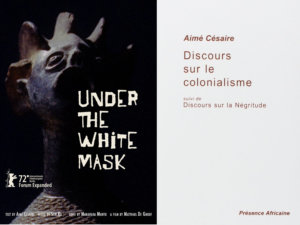_________________________________________________
An excerpt translated into Lingala from Aimé Césaire’s Discours sur le colonialisme (published by Présence Africaine in 1955 for its current edition) is featured in this important short film directed by Matthias de Groof.

From Haesaerts to Césaire
In a compelling short film directed by Matthias De Groof and produced by Cobra Films, Under the White Mask, fragments from the 1958 film Under the Black Mask, which was once deemed colonial propaganda, come to life in a fresh perspective. Directed by Belgian artist Paul Haesaerts, the original film depicted Congolese art as objects of fascination, embodying the Eurocentric colonial perspective of the time. However, this new film, Under the White Mask, endeavors to give a voice to these masks, allowing them to transcend their object status and speak their truth.
An Excerpt of the historical Discourse on colonialism in Lingala thanks to the late Bienvenu Sene Mongaba
One of the notable aspects of this film is the inclusion of an excerpt of Aimé Césaire’s Discourse on Colonialism (published by Présence Africaine Editions), delivered in Lingala for the first time, with a powerful reading by Maravilha Munto and a historical translation by the late Bienvenu Sene Mongaba: one of the greatest promoters of the Lingala language. This powerful Discourse, which remains a critical mirror for Europe, challenges and reflects upon the colonial legacy, inviting viewers to engage with a nuanced understanding of the past. Under the White Mask carefully incorporates elements from the 1958 film, working with the historical material and transforming it into a thought-provoking narrative.
Présence Africaine: Symbol
It is also worth acknowledging the symbolic significance of the work of Présence Africaine, the publisher of Aimé Césaire’s Discourse on Colonialism. This pioneering publishing house has played a pivotal role in disseminating African and Afro-Caribbean voices and ideas, providing a platform for essential intellectual and political texts. The translation of an excerpt of this major 20th-century text into Lingala represents an act of cultural and linguistic revitalization, allowing a new generation to explore and embrace this fundamental work of anti-colonial literature. It serves as a compelling example of how culture, literature, and cinema can combine to challenge historical narratives and give a voice to voices that have long been oppressed.
International attention
The film is now making its mark at various international film festivals, showcasing its relevance and the resonance of its message. Its screenings at institutions like the Maria Vera, Kino Rebelde, and the Aljube Museum Resistance and Freedom have underscored its impact on diverse audiences across the world.
More information on the film: here
Discourse on Colonialism on Présence Africaine
Book Information: here
